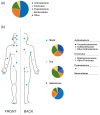Microbiome-Based Products: Therapeutic Potential for Inflammatory Skin Diseases
- PMID: 40724992
- PMCID: PMC12295770
- DOI: 10.3390/ijms26146745
Microbiome-Based Products: Therapeutic Potential for Inflammatory Skin Diseases
Abstract
Maintaining a balanced skin microbiota is essential for skin health, whereas disruptions in skin microbiota composition, known as dysbiosis, can contribute to the onset and progression of various skin disorders. Microbiota dysbiosis has been associated with several inflammatory skin conditions, including atopic dermatitis, seborrheic dermatitis, acne, psoriasis, and rosacea. Recent advances in high-throughput sequencing and metagenomic analyses have provided a deeper understanding of the skin microbial communities in both health and disease. These discoveries are now being translated into novel therapeutic approaches aimed at restoring microbial balance and promoting skin health through microbiome-based interventions. Unlike conventional therapies that often disrupt the microbiota and lead to side effects or resistance, microbiome-based products offer a more targeted strategy for preventing and managing inflammatory skin diseases. These products, which include probiotics, prebiotics, postbiotics, and live biotherapeutic agents, are designed to modulate the skin ecosystem by enhancing beneficial microbial populations, suppressing pathogenic strains, and enhancing immune tolerance. As a result, they represent a promising class of products with the potential to prevent, manage, and even reverse inflammatory skin conditions. However, realizing the full therapeutic potential of microbiome-based strategies in dermatology will require continued research, robust clinical validation, and clear regulatory frameworks.
Keywords: dysbiosis; human microbiota; inflammatory skin disease; microbiome-based products.
Conflict of interest statement
The authors declare no conflicts of interest.
Figures


References
Publication types
MeSH terms
Substances
Grants and funding
LinkOut - more resources
Full Text Sources
Medical
Research Materials

